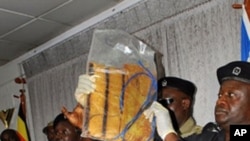Police in Uganda have discovered an unexploded suicide vest - one day after twin blasts killed 76 World Cup fans in the capital, Kampala.
The head of Uganda's police counterterrorism division, Abas Byakagaba, says the unexploded vest was discovered Monday by a Kampala resident at a discotheque in the Makindye district.
Byakagaba showed reporters in Kampala a black laptop bag, which he says contained the vest and two large slabs of brownish-colored explosives material fitted with an electric detonator.
"What you see here are explosives, including the blue wires. Inside the brownish material are the ball bearings. Those are meant to accelerate the effect of the explosives. And here is the jacket, where all these materials are supposed to go," explained Byakagaba.
It is not clear why the bomb was left at the club. Police theorize that the would-be bomber may have changed his mind before setting off the charge. They also say the vest was designed so that it could be planted, rather than detonated by a suicide bomber.
Ugandan police chief, Kale Kayihura, says the police are studying the contents of the laptop bag for clues that might lead them to the men who planned and carried out Sunday evening's dual attacks.
"What we found here is consistent with what we found on both scenes of crime. So, this is a very significant lead in our investigation," said Kayihura.
At least four people are believed to have been arrested in connection with the bombings. The nationalities of those arrested have not been released, but Ugandan officials have hinted that one of the suicide bombers may have been a Somali.
Somalia's extremist insurgent group, al-Shabab, has claimed responsibility for the Kampala bombings, the deadliest in East Africa since the 1998 U.S. embassy bombings in Kenya and Tanzania.
The terrorists say the attacks were in retaliation for Uganda's refusal to withdraw its peacekeeping troops from Mogadishu. Al-Shabab has also threatened to attack Burundi, the other African nation that has peacekeeping troops in Somalia.
The African Union peacekeeping force has been a major obstacle in al-Shabab's efforts to take power in Mogadishu and turn the country into an ultra-conservative Islamic state.
Al-Shabab's leadership is composed of Somalis trained by al-Qaida in Afghanistan. But several-hundred foreign al-Qaida fighters are also believed to be in Somalia, acting as instructors for recruits and operational leaders. In recent years, al-Shabab militants have carried out suicide bombings in Somalia reminiscent of attacks blamed on al-Qaida affiliate groups in such places as Iraq and Pakistan.
Prior to Sunday, the group had never attacked outside Somali borders. Analysts say the bombings have firmly placed al-Shabab in the category of a "transnational terrorist group," significantly raising the security stakes in the region.
Ugandan Police Discover Unexploded Suicide Vest




